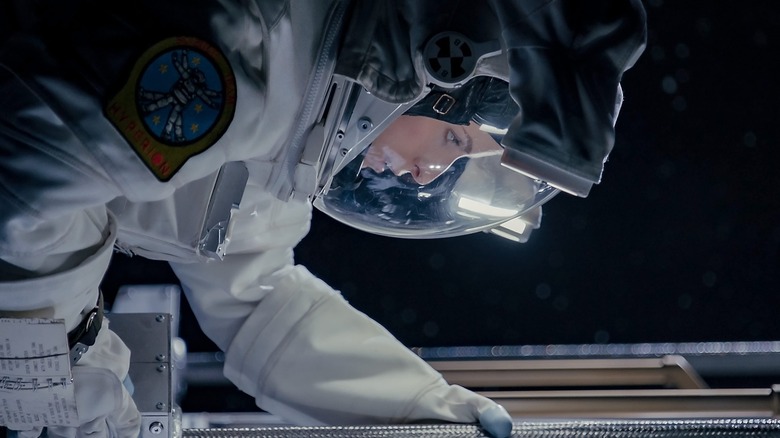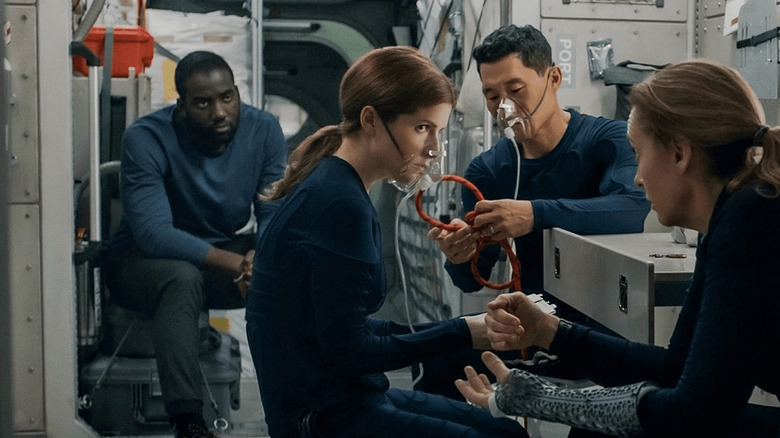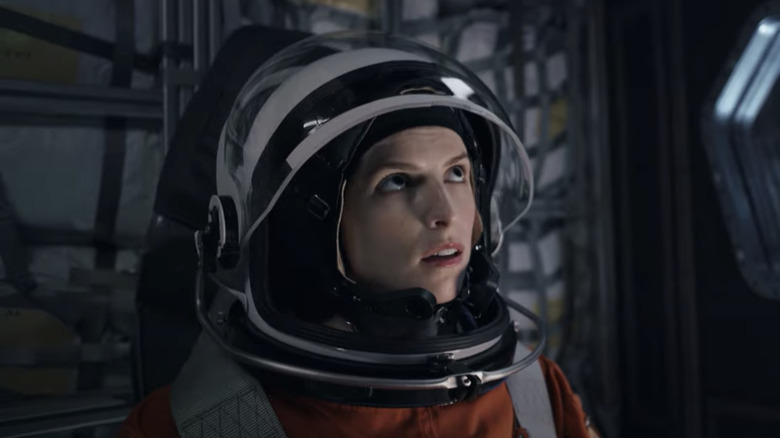Stowaway Review: An Intergalactic Bore
Is there a name for the kind of film where you spend the entire time assuming that there must be a big twist on the way, and that the film can't just be this ordinary, only to be proven wrong? This is what I found myself asking as I got deeper into the third act of "Stowaway," a generic science fiction thriller now streaming on Netflix. Set on board a spaceship headed to Mars for a two-year research mission, the story's cast of characters includes ship commander Marina Barnett (Toni Collette), biologist David Kim (Daniel Dae Kim), and researcher Zoe Levenson (Anna Kendrick) as they acclimate to a life away from Earth. In these initial stages, this largely means speaking to journalists thousands of miles away as they embark on their journey to the red planet.
Not long after, they are startled by finding the unconscious body of Michael Adams ("Wynonna Earp" star Shamier Anderson), who appears to have been hiding on board the spacecraft prior to takeoff. But there's no suggestion of any ulterior motive; he's startled to discover he's on board and won't be home for a couple of years, and is distraught that the crew are in no position to turn back and take him home. It's no surprise that things start going wrong after this — the spacecraft was only designed to safely house a maximum of three people, and this unplanned passenger is causing a drastic reduction in oxygen levels onboard. The team are divided by the awkward position they're put in, as going home equally remains impossible: do they kill their stowaway to safely complete the mission, or do they try find a solution in the 20 days before their current supply fully runs out?
Indebted to classic sci-fi - without realizing what made those stories classics
It's a classic morality play scenario, and one loosely adapted from one of the most influential science fiction short stories of all, Tom Godwin's "The Cold Equations." That also followed a stowaway on a spacecraft who threatened everybody's life by making the journey — in that case, by making the ship exceed its total weight limit. The story remains influential, even getting adapted as a "Twilight Zone" episode, but has managed to annoy anybody with a passing interest in space travel due to representing a moral hazard with no basis in the physics or engineering behind it. Unless you're Neil deGrasse Tyson and nitpicking the science in popcorn movies is a beloved hobby, such heightened stakes won't be an issue, but nevertheless, director Joe Penna has reconfigured the story to try make it as scientifically accurate as possible. Enlisting the help of fellow YouTuber Scott Manley, he made changes to the screenplay (most notably, the design of the ship itself) that would allow the threat to not just be more dramatic than in the short story, but have a basis in scientific fact.
But by focusing too much on the science, he's overlooked the real problem with his screenplay: characters written with such lack of depth that the newfound realism behind their life-and-death stakes becomes irrelevant. One of the reasons many viewers will be left guessing a big twist that doesn't materialize is through the thin characterization offered to the titular stowaway. The initial explanation as to why he ended up on board is from his role as a launchpad engineer, and there's no suggestion of nefarious intent — after all, he has a sister who needs his care back home, and after waking up, he pleads to have the ship turned around so he doesn't spend two years away. But there still remains a vagueness to the specifics of how he wound up on board that the film shows no interest in developing further, nor a direct emotional connection to the crew like the stowaway character in the source material.
A stronger screenplay would have made him out to be a more untrustworthy figure, fueling the paranoia of the three scientists onboard, divided between knowing whether his version of events was the truth and heightening the intensity of their life-threatening stakes. Instead, Penna and co-screenwriter Ryan Morrison show no interest in fleshing him out as anything beyond a MacGuffin, the term Alfred Hitchcock used for a device that exists to push the plot forward for the main characters despite being generally irrelevant to the story itself. By the time we get to the third act and Zoe and Daniel embark upon a life-threatening mission to secure enough CO2 for the ship, Michael becomes a peripheral figure in the drama, while the central trio are never fleshed out to become anything more than archetypes. It's a mortal sin of film criticism to review the film you wished you saw rather than the one you'd watched, but "Stowaway" could have been tweaked to become something more substantial than the generic space thriller it is. Is there any wonder I was left imagining outlandish twists when faced with the dull drama unfolding onscreen?
You've seen this film before
Even though it wasn't produced in-house by Netflix, while watching I couldn't help but feel the only reason they raced to snap up the rights to such a generic space survival thriller was because of its similarities to much better films. You know when you search for a film or TV show on Netflix that isn't currently streaming, but the search bar allows you to "explore titles related to" it, all of which happen to be remarkably similar Netflix originals? Well, for anybody looking to watch the likes of Alfonso Cuarón's "Gravity" or Ridley Scott's "The Martian" when they're not streaming on the platform, expect the algorithm to shove this in your face instead. This is a space-bound disaster movie and a life or death mission to Mars movie all in one — if it weren't made independently, you'd assume the screenplay was written by an AI that had been fed the scripts of every original intergalactic blockbuster of the last decade. That certainly would explain the lack of heart at the center of what should be a deeply existential story.
Which isn't to suggest that there aren't any positives to "Stowaway." The opening ten-minute sequence, which tracks the crew in tight closeup as their ship blasts off into space, is an imaginative way of depicting this part of the mission on a tight budget. Coupled with the evocative sound design, it's the only time in the film that you can imagine this playing on the big screen to some form of engaged audience response, and not just existing as something you're half paying attention to in a separate browser tab. Outside of this, there isn't much in the way of originality to hold your attention, and that isn't restricted to just how similar it is to other recent sci-fi blockbusters. In what is only his second film, director Joe Penna is already showing signs of repeating himself.
His directorial debut, 2018's "Arctic," was an even more ambitious survival thriller, stranding Mads Mikkelsen in (you guessed it!) the arctic, where he too had to deal with dwindling supplies, and the arrival of another person who gets stranded with him entirely by accident. Despite the change of setting, Penna has barely tweaked this simplistic disaster movie formula, and hasn't fleshed out his characters to help distract from the familiarity. It's a box-ticking exercise of overplayed tropes, and at a certain point, you'll find yourself checking out from the mission in a way the characters can't.
"Stowaway" never takes full advantage of its simple but ingenious premise, and can't help but feel like a missed opportunity.


